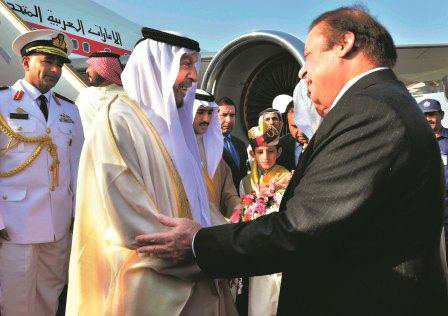
“It is a great honour to represent Pakistan as an ambassador in the brotherly country of the United Arab Emirates,” says Asif Ali Khan Durrani, who took over as Pakistani Ambassador to the UAE in February, filling the void created
by the departure of Jamil Khan last June.
“Our close bonds of friendship and presence of millions of our countrymen in GCC countries place an enormous responsibility on the shoulders of the ambassador of Pakistan,” he tells GN Focus.
“The region is faced with new challenges, especially after the Arab Spring.
“It is a great tribute to the sagacious leadership of His Highness Shaikh Khalifa Bin Zayed Al Nahyan, President of the UAE, Supreme Commander of the UAE Armed Forces and Ruler of Abu Dhabi, that the UAE has emerged as a stable and strong country.”
The appointment of a career diplomat as ambassador to Pakistan was welcomed by Pakistani expatriates in the UAE, according to a Gulf News report at the time, detailing that it is the first time in more than 20 years that a career diplomat has been selected for the post.“Being the representative of my country is an honour and a matter of pride,” says Durrani, adding that he also feels a deep sense of fulfilment whenever making a contribution towards benefiting his country and the Pakistani community in the UAE. “But it also brings enormous challenges,” he says.
Durrani joined the Foreign Service of Pakistan in 1986 and served in various diplomatic missions abroad including New Delhi, Tehran, New York, Kabul and London, from 1990 to 1994. He also served in the Ministry of Foreign Affairs in Islamabad.
The ambassador hopes to further strengthen bilateral relations between the UAE and Pakistan as well as provide better embassy services for the large community. “It is my endeavour to continue these efforts in the best interests of Pakistan and our people,” he says.
About 1.2 million Pakistani expatriates live in the UAE, and the important role Pakistani workers have played in the development of the UAE over the last four decades is a matter of great pride, says Durrani.
“We are endeavouring with UAE authorities to bring more skilled workers and professionals from Pakistan to the UAE. The Expo 2020 would bring about immense employment and business opportunities that we hope to avail. A new memorandum of understanding between the two countries is under active consideration and will hopefully be signed soon.”
Cultural affinity
Pakistan and the UAE enjoy “extremely close and fraternal relations”, which Durrani notes is based on common faith, traditions, deep-rooted cultural affinities, geographic proximity and similar interests, with the leadership of the two countries having a close relationship and maintaining close contact on a wide range of bilateral and international issues. “Shaikh Khalifa was in Pakistan for two weeks only recently where he met with Prime Minister Nawaz Sharif,” he adds.
Earlier this month, Shaikh Khalifa ordered the dispatch of 1,500 tonnes of food aid to 20,000 needy families in the famine-stricken Tharparkar district.
The 11th session of the Joint Ministerial Commission (JMC) of the two countries, held in Islamabad in November, is an indication as to the level of cooperation. Sartaj Aziz, Adviser to the Pakistani Prime Minister, and UAE Foreign Minister Shaikh Abdullah Bin Zayed Al Nahyan, held wide-ranging consultations and exchanged views on regional and international issues of bilateral interest on the sidelines of the JMC session. The representatives agreed to continue to strengthen ties and push forward economic and trade relations.
Says Durrani, “Over the past few years, the UAE by virtue of its re-export hub, has emerged as the second-largest trading partner of Pakistan.”
The past eight years have seen trade volume, around $2 billion (Dh7.34 billion) during the fiscal year 2000 to 2001, rise to $9.17 billion during the fiscal year 2012 to 2013, with the UAE emerging as the second-largest destination for Pakistani exports. “The UAE is also one of the largest sources of foreign direct investment in Pakistan,” adds Durrani.
Major UAE exports to Pakistan include petroleum, iron ore, plastic material, chemical products, machinery items and gold (semi-manufactured), while the most prominent exports from Pakistan include rice, meat and other food products, art, silk and synthetic textiles, bedding, ready-made garments, leather goods and fruits and vegetables. Durrani says, “Some of the lucrative areas in Pakistan are oil and gas, energy, agriculture and agro-based products, infrastructure, mining, minerals, health, tourism and real estate.”
“UAE business groups are fully cognisant of potential investment opportunities in Pakistan and are investing in a significant number,” he explains.
Averting a crisis
Arab National Construction Holdings of Dubai is assisting Pakistan in overcoming its energy shortages. An agreement was signed in early March in Islamabad with the Ministry of Water and Power to construct two coal-based power plants at Gadani, a jetty for coal import and a transmission line to add 1,320 megawatts of electricity to the national grid at an investment of $2.5 billion, according to a report in Pakistani newspaper Dawn. The paper quoted Sharif labelling the deal “another milestone in the path towards energy self-reliance”.
Tourism is growing, and Durrani hopes more Emiratis will travel to the country as it improves tourism facilities, especially in the north. Last year an estimated 4,000 Emiratis visited Pakistan, attracted by a unique history and cultural heritage, including one of the world’s earliest human settlements.


